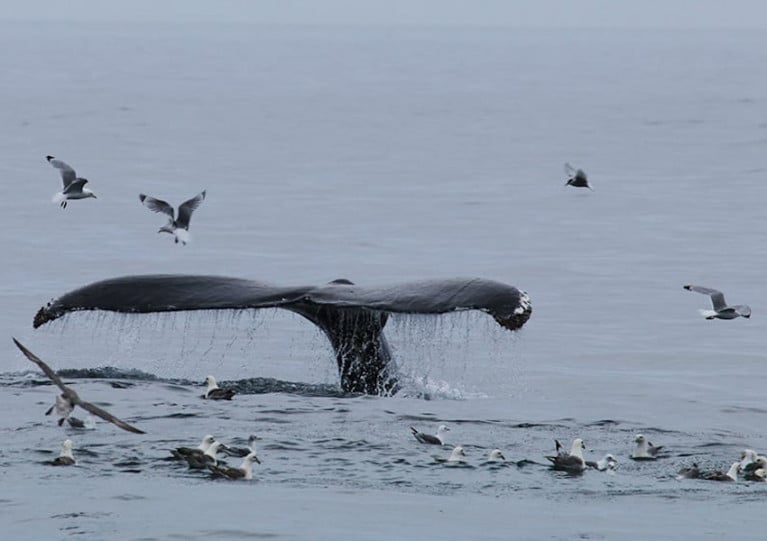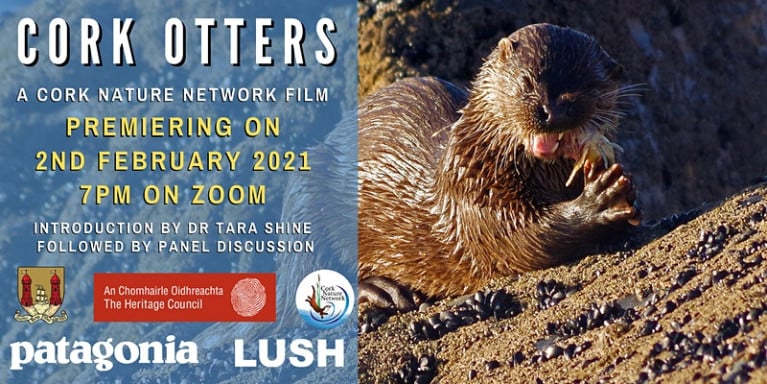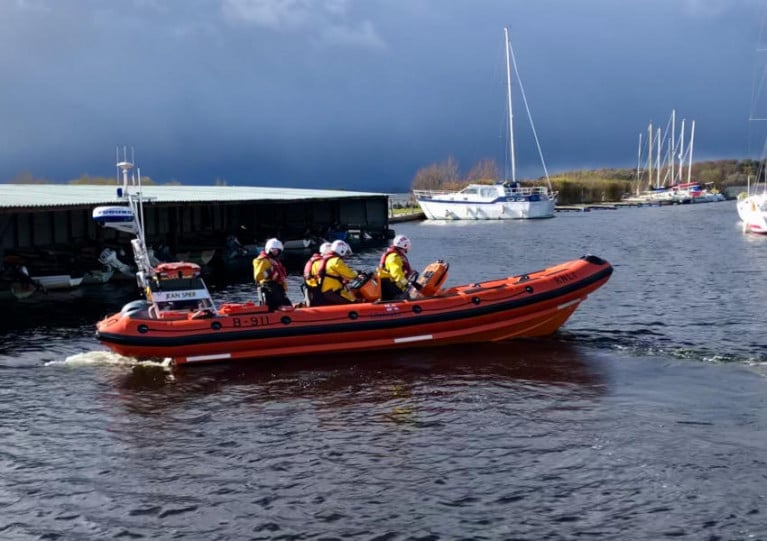Displaying items by tag: documentary
A new TV series as Gaeilge follows presenters Tessa Fleming and Irial Ó Ceallaigh as they embark on an epic adventure paddling their way along the North Coast.
Together with kayaking expert John Hubbocks, the novice kayakers brave the unpredictable Atlantic wind and waves, pushing themselves beyond their comfort zones to complete their challenge.
This four-part series Kayak-Ó-Thuaidh, made by Macha Media for BBC Gaeilge and RTÉ with support from Northern Ireland Screen’s Irish Language Broadcast Fund, showcases the stunning scenery of the northern Atlantic coastline, its rich history and the people who call it home.
Tessa and Irial face many challenges along the way and draw on their inner strength and physical stamina to navigate storms, tides and physical injuries, as they paddle from northwest Donegal to the northeast coast of Co Antrim.
In the first episode, on BBC iPlayer and BBC Two Northern Ireland on Monday 11 March at 10pm, the presenters undergo difficult training sessions in Co Down before starting their journey at Bunbeg harbour in Co Donegal. Their first challenge takes them to Gola Island and then to the Bloody Foreland in Gaoth Dobhair.
Episode two continues with a challenging paddle that takes them from Magheraroarty Beach to Tory Island and on to Sheephaven Bay, concluding at the iconic lighthouse on the edge of the Fanad peninsula.
Our adventurers tackle the Inishowen peninsula in episode three, setting off from Fort Dunree they make their way to Inishtrahull, Ireland’s most northerly island, and continue eastwards towards Lough Foyle and Magilligan.
In the final episode, Tessa and Irial embark on the last leg of their journey from Magilligan to Ballycastle, with one last push taking them to the spectacular wildlife haven of Rathlin Island.
Kayak Ó Thuaidh starts on Monday 11 March at 10pm on BBC iPlayer and BBC Two Northern Ireland. All four episodes will be available to watch for viewers in Northern Ireland on BBC iPlayer from this date.
New Three-Part Documentary Is an All-Access Pass Behind the Scenes of The Ocean Race
A three-part TV documentary featuring a deep dive into the lives of the sailors and teams competing in The Ocean Race 2022-23 is now streaming on discovery+ and the Eurosport app.
A Voyage of Discovery: The Ocean Race follows key sailors from the five IMOCA teams racing around the world, including the skipper of the winning 11th Hour Racing Team, American sailor Charlie Enright.
Viewers are taken behind the scenes and given an all-access pass to live the drama of the toughest fully crewed race in the world, experiencing all of the highs and lows as the best sailors in the world take on this iconic offshore challenge.
All five race teams feature in the documentary, which takes a close look at the event through the lived experience of four sailors including Enright, GUYOT environnement – Team Europe crew member Annie Lush, Biotherm skipper Paul Meilhat and Team Malizia co-skipper Rosalin Kuiper.
“I’m super excited about the documentary,” said Kuiper. “It was very special to be part of it and I shared my feelings and thoughts with the producers like I would with my family and that was special. I’m excited to see it as I had no filter and really shared everything from my heart.
“It’s a really cool way to go behind the scenes and dive into a sailor’s brain. I hope we can continue this in the future, to allow us to show the human adventure in addition to the sporting side.”
A Voyage of Discovery: The Ocean Race is the latest television output from the 50th anniversary edition of The Ocean Race, which started in Alicante, Spain on 15 January this year and finished at the Grand Finale in Genoa, Italy on 30 June.
A Voyage of Discovery: The Ocean Race was broadcast exclusively in three parts across Europe at Friday 3, Saturday 4 and Sunday 5 November on Eurosport’s channels. Streaming of all three episodes is available on discovery+ and the Eurosport app in Europe, and Eurosport Extra in Poland.
The three-part series was produced and directed by Robert Bevan and edited by Steven Douglas Blake for Warner Bros Discovery.
The volunteer lifeboat crew from Larne RNLI in Northern Ireland will feature in the new series of popular TV show Saving Lives at Sea on BBC Two at 8pm next Thursday 12 October.
Featuring footage captured on helmet and boat cameras, viewers watch dramatic rescues through the eyes of RNLI lifesavers while meeting the people behind the pagers and those rescued by the charity’s lifesavers.
The popular 10-part documentary is now in its eighth series and includes the lifesaving work of RNLI volunteer lifeboat crews and lifeguards from around Ireland and the UK.
It’s also available to watch on the BBC iPlayer for viewers in the UK following broadcast.
Including interviews with lifeboat crews and lifeguards, the series will also hear from those rescued and their families who, thanks to RNLI lifesavers, are here to tell the tale.
This forthcoming episode, on Thursday 12 October, includes Larne RNLI’s rescue of a capsized kayaker alongside rescue stories from their colleagues at other stations and beaches around the coast.
Larne RNLI helm Barry Kirkpatrick, who was on the call-out and will feature in the upcoming episode, said: “Our lifesaving work would not be possible without donations from the public and we are delighted to be able to share a frontline view of the rescues they support with their kind generosity.
“This is the first time Larne RNLI features on the Saving Lives at Sea series and this rescue is a good example of where our volunteers’ training, skills and experience all come to the fore in helping bring a casualty to safety. It also highlights the great teamwork not just among our own volunteers but with our colleagues from the various emergency services.
“The call for help in this rescue comes late at night following reports of a person capsized from their kayak. After a search, we locate the casualty floating on his back in the middle of the bay, who is estimated to be in the water for up to one hour and very cold.
“We bring him onboard the lifeboat and make our way back to the beach as quickly as possible while beginning first aid to try and warm him up but we are concerned about signs of hypothermia. Once on shore, we are assisted by our colleagues in the coastguard and the Northern Ireland Ambulance Service.
“In this rescue, the casualty's wife does the right thing by calling 999 and asking for the Coastguard when she realises her husband is in difficulty in the water. The kayaker also does the right thing by floating on his back with his arms stretched out. He is floating to live.”
If you get inspired to volunteer with the RNLI by the series, there are a variety of roles from lifeboat crew, to fundraiser, lifeguard to shop volunteer. Fund out more at rnli.org/volunteer
Ahead of its broadcast this weekend, Newstalk previews A Sea of Sound, a new radio documentary that explores the impact of noise pollution on marine wildlife.
Marine mammals such as dolphins and whales effectively ‘see’ through sound in the water. “So to understand the life they lead, as the Irish Whale and Dolphin Group’s Simon Berrow says, we need to “think acoustically”.
Producer John Higgins spoke to Berrow and other environmental stakeholders for the documentary, which also features some of the remarkable sounds of whales and dolphins communicating beneath the waves — and explores the sounds that threaten them, from seismic surveys to military sonar and more.
A Sea of Sound will be broadcast on Newstalk this Sunday morning 27 March at 7am, with a repeat on Saturday 2 April at 9pm. It will also be available as a podcast.
Leading Sailing Historian Hal Sisk Among Those Lauding Classic International Dragon in New Video
The International Dragon One Design has been an important of Irish sailing since the 1930s, writes W M Nixon.
This classic boat’s good looks and excellent performance continues to provide rewarding racing for sailors of all ages worldwide.
Indeed, a recently released film, titled Setting Hearts on Fire, captures the flavour of these specie craft.
And though it costs €100 to access the complete package, this free video trailer — including an input from leading Irish and international yachting historian Hal Sisk of Dun Laoghaire — makes for evocative viewing of a great boat.
New Documentary Captures the ‘Secret’ History of Surfing in Ireland
Some of the faces featured in a new documentary on the origins and future of surfing in Ireland have been profiled in The Irish Times.
Keep It A Secret is the work of Irish-American film-maker Seán Duggan, who brought his camera to Tramore four years ago capture the 50-year reunion of many of the pioneers involved in the first Irish Surfing Championships.
From there, Sean followed the threads of Ireland’s surprisingly colourful surfing tapestry through the tumult of the Troubles to the present day — via Northern Ireland’s ‘black wetsuit brigade’ to the Brittons of Rossnowlagh, the big waves sought by Conor Maguire and even the unlikely early surfing hub of Bray in Co Wicklow.
The Irish Times has much more on the story HERE.
Award-Winning Documentary Filmed on Carlingford Lough Ferry Set for Drive-In Premiere This Week
A documentary on the lives of people in coastal communities connected by the Carlingford Lough ferry will have its premiere in a special outdoor drive-in screening this Thursday (19 August).
Four Seasons in a Day is one of six documentaries in the Borderline series focused on border regions around Europe and the people who live there.
Already an award winner, Annabel Verbeke’s film — which was broadcast on RTÉ One last Tuesday — explores the complexities of Brexit through the eyes of locals and visitors alike via the ferry that links Greenore in Co Louth with Greencastle in Co Down.
The film will have its premiere screening on the island of Ireland in a special event at the Carlingford Lough Ferry terminal in Greencastle this Thursday evening at 8pm.
Tickets priced at €27.55 per car are available from the Eventbrite page HERE. The film can also be streamed by viewers in Ireland on the RTÉ Player.
Viewers in Ireland have another chance to catch a fascinating documentary on a unique expedition to the Arctic Circle tracing the origins of Ireland’s annual humpback whale visitors.
Broadcast yesterday evening on RTÉ One, Ireland to Iceland - On the Trail of the Humpback Whale follows marine wildlife researchers and volunteers with the Irish Whale and Dolphin Group (IWDG) on their weeks-long passage to Ireland in search of humpback whales in 2018.
As previously reported on Afloat.ie, Tony Whelan’s film also charts the links that the Irish crew made with Iceland and the costal communities they met along the way.
Now the film is available to watch for 30 days for viewers in the Republic of Ireland on the RTÉ Player.
Short Film on Cork’s Otters to Have Online Premiere
The otters of Cork get a tribute in a new documentary that gets its online premiere this Tuesday 2 February at 7pm.
Made by the Cork Nature Network with funds from The Heritage Council among others, Cork Otters explores the lives of these elusive marine wildlife residents of the River Lee.
Free tickets for this Zoom screening — featuring a discussion and Q&A with an expert panel — are already booked out. But you can get in touch to enquire about the waiting list in case more viewing spots become available.
Tuesday 13 October at 8pm is the date and time for your TV diary to see the volunteer crew of Lough Derg RNLI feature in the current series of Saving Lives at Sea on BBC Two.
Viewers will see Lough Derg’s lifeboat crew rescue a man who fell overboard in rough weather and an eerie night time launch in fog, alongside rescue stories from their colleagues at other stations and beaches around our coasts.
Saving Lives at Sea features real-life rescue footage captured on helmet cameras gives a frontline view of how the RNLI’s lifesavers risk their own lives as they go to the aid of those in danger at sea.
That’s accompanied by emotive interviews from the volunteer lifeboat crews and lifeguards from around Ireland and the UK, alongside the people they rescue and their families.
Lough Derg’s upcoming profile follows on from Lough Ree lifesavers’ appearance in last year’s series of the hit TV documentary, as previously reported on Afloat.ie.
And in next week's episode, the volunteer crew of Skerries RNLI will feature with their rescue of a teenage paddle boarder who was blown out to sea.
“It’s great that we can showcase the lifesaving work of RNLI volunteers in a TV programme like this,” said Lough Derg helm Eleanor Hooker.
“In recent months, the pandemic has presented RNLI volunteers with additional challenges, but we’ve continued to maintain a 24/7 search and rescue service.
“This year, due to Covid, fundraising events have been cancelled and we’ve seen a drop in our charitable income. Without the generous support and donations from the public, we wouldn’t be able to save lives at sea.
“It’s great that with the Saving Lives at Sea programme our supporters can see what we do out on a shout, and from the comfort of their own home. We need their support more than ever during these challenging times.”
Saving Lives at Sea is broadcast Tuesdays at 8pm on BBC Two, NI, and viewers in the UK can also watch the series on demand following broadcast on the BBC iPlayer.
































































